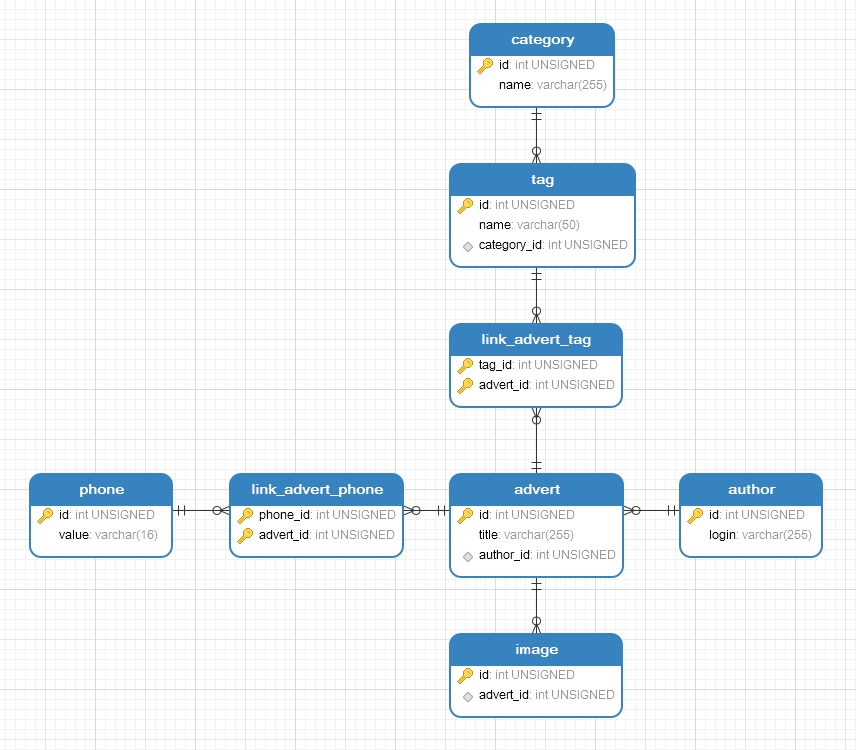Answer the question
In order to leave comments, you need to log in
Is there an ORM in PHP that allows you to take data with a complex structure from the database?
Let me explain what I mean.
Let's say there is a table with ads. Each ad has data associated with it:
1) Tags
1.1) Tag category
2) Phone numbers
3) Images
4) Author

SET FOREIGN_KEY_CHECKS=0;
-- ----------------------------
-- Table structure for advert
-- ----------------------------
DROP TABLE IF EXISTS `advert`;
CREATE TABLE `advert` (
`id` int(10) unsigned NOT NULL AUTO_INCREMENT,
`title` varchar(255) NOT NULL,
`author_id` int(10) unsigned NOT NULL,
PRIMARY KEY (`id`),
KEY `author_id` (`author_id`),
CONSTRAINT `advert_ibfk_1` FOREIGN KEY (`author_id`) REFERENCES `author` (`id`) ON DELETE CASCADE ON UPDATE CASCADE
) ENGINE=InnoDB DEFAULT CHARSET=utf8;
-- ----------------------------
-- Table structure for author
-- ----------------------------
DROP TABLE IF EXISTS `author`;
CREATE TABLE `author` (
`id` int(10) unsigned NOT NULL AUTO_INCREMENT,
`login` varchar(255) NOT NULL,
PRIMARY KEY (`id`)
) ENGINE=InnoDB DEFAULT CHARSET=utf8;
-- ----------------------------
-- Table structure for category
-- ----------------------------
DROP TABLE IF EXISTS `category`;
CREATE TABLE `category` (
`id` int(10) unsigned NOT NULL AUTO_INCREMENT,
`name` varchar(255) NOT NULL,
PRIMARY KEY (`id`)
) ENGINE=InnoDB DEFAULT CHARSET=utf8;
-- ----------------------------
-- Table structure for image
-- ----------------------------
DROP TABLE IF EXISTS `image`;
CREATE TABLE `image` (
`id` int(10) unsigned NOT NULL AUTO_INCREMENT,
`advert_id` int(10) unsigned NOT NULL,
PRIMARY KEY (`id`),
KEY `advert_id` (`advert_id`),
CONSTRAINT `image_ibfk_1` FOREIGN KEY (`advert_id`) REFERENCES `advert` (`id`) ON DELETE CASCADE ON UPDATE CASCADE
) ENGINE=InnoDB DEFAULT CHARSET=utf8;
-- ----------------------------
-- Table structure for link_advert_phone
-- ----------------------------
DROP TABLE IF EXISTS `link_advert_phone`;
CREATE TABLE `link_advert_phone` (
`phone_id` int(10) unsigned NOT NULL,
`advert_id` int(10) unsigned NOT NULL,
PRIMARY KEY (`advert_id`,`phone_id`),
KEY `phone_id` (`phone_id`),
CONSTRAINT `link_advert_phone_ibfk_1` FOREIGN KEY (`phone_id`) REFERENCES `phone` (`id`) ON DELETE CASCADE ON UPDATE CASCADE,
CONSTRAINT `link_advert_phone_ibfk_2` FOREIGN KEY (`advert_id`) REFERENCES `advert` (`id`) ON DELETE CASCADE ON UPDATE CASCADE
) ENGINE=InnoDB DEFAULT CHARSET=utf8;
-- ----------------------------
-- Table structure for link_advert_tag
-- ----------------------------
DROP TABLE IF EXISTS `link_advert_tag`;
CREATE TABLE `link_advert_tag` (
`tag_id` int(10) unsigned NOT NULL,
`advert_id` int(10) unsigned NOT NULL,
PRIMARY KEY (`tag_id`,`advert_id`),
KEY `advert_id` (`advert_id`),
CONSTRAINT `link_advert_tag_ibfk_1` FOREIGN KEY (`tag_id`) REFERENCES `tag` (`id`) ON DELETE CASCADE ON UPDATE CASCADE,
CONSTRAINT `link_advert_tag_ibfk_2` FOREIGN KEY (`advert_id`) REFERENCES `advert` (`id`) ON DELETE CASCADE ON UPDATE CASCADE
) ENGINE=InnoDB DEFAULT CHARSET=utf8;
-- ----------------------------
-- Table structure for phone
-- ----------------------------
DROP TABLE IF EXISTS `phone`;
CREATE TABLE `phone` (
`id` int(10) unsigned NOT NULL AUTO_INCREMENT,
`value` varchar(16) NOT NULL,
PRIMARY KEY (`id`)
) ENGINE=InnoDB DEFAULT CHARSET=utf8;
-- ----------------------------
-- Table structure for tag
-- ----------------------------
DROP TABLE IF EXISTS `tag`;
CREATE TABLE `tag` (
`id` int(10) unsigned NOT NULL AUTO_INCREMENT,
`name` varchar(50) NOT NULL,
`category_id` int(10) unsigned NOT NULL,
PRIMARY KEY (`id`),
KEY `category_id` (`category_id`),
CONSTRAINT `tag_ibfk_1` FOREIGN KEY (`category_id`) REFERENCES `category` (`id`) ON DELETE CASCADE ON UPDATE CASCADE
) ENGINE=InnoDB DEFAULT CHARSET=utf8;
SET FOREIGN_KEY_CHECKS=1;$result = $db->getTable('advert')
->select()
->limit(180)
->offset(0)
->cache(5)
->link('author')
->link('image')
->link('link_advert_phone.phone')
->link('link_advert_tag.tag.category')
->query()
;$result = [
[
'id' => 1,
'title' => '....',
'author_id' => 1,
'author_id.author.id' => [
'id' => 1,
'login' => 'user name',
],
'id.image.advert_id' => [
[
'id' => 1,
'advert_id' => 1,
],
[
'id' => 2,
'advert_id' => 1,
],
// ....
],
'id.link_advert_phone.advert_id' => [
[
'advert_id' => 1,
'phone_id' => 1,
'phone_id.phone.id' => [
'id' => 1,
'value' => '+996......',
]
],
// ....
],
'id.link_advert_tag.advert_id' => [
[
'advert_id' => 1,
'tag_id' => 1,
'tag_id.tag.id' => [
'id' => 1,
'name' => 'Тег',
'category_id' => 1,
'category_id.category.id' => [
'id' => 1,
'name' => 'Категоряия',
]
]
],
// ....
],
],
// ...
];Answer the question
In order to leave comments, you need to log in
It's not a complex structure. What's more, with an ORM, it's easier: there won't be separate entities for your link_ tables.
The two most popular options are Eloquent (based on the Active Record anti-pattern) and Doctrine (Data Mapper).
Tried doctrine, it increases the time from 200ms to about 3 seconds,Request time? If so, then you made a mistake somewhere: the most common requests are generated there.
plus the complexity of writing queries increases by an order of magnitude.The complexity of entry increases, it is more difficult for beginners. The complexity of daily work falls. And the complexity of support (work with long-term projects) falls by several orders of magnitude.
Try the Yii2 framework - it has an ORM. Ready-made models that work through functions, everything is simple, write in the controller what you want to see in the view through the action, and you're done! Displays information of any complexity. I still do not regret that I chose this framework. It is flexible, able to implement many different tasks. Many different data processing solutions are written under Yii2. Save development time. Such questions will disappear. There are many lessons on youtube, if you know php, MySQL, sql, then you can easily configure, install and package everything. The box contains basic solutions, you can add third-party developments for free. And not only.
And the number of tables can be reduced php.net/manual/ru/function.implode.php
Didn't find what you were looking for?
Ask your questionAsk a Question
731 491 924 answers to any question